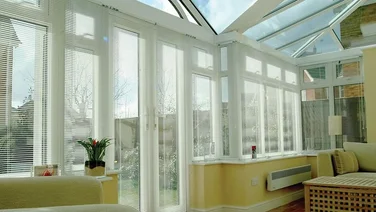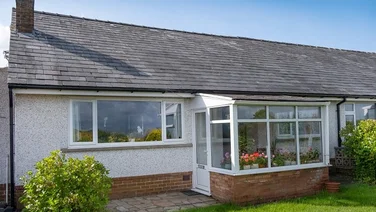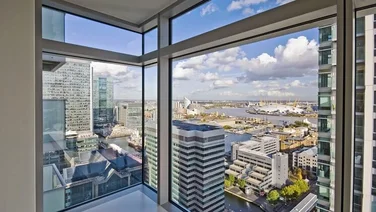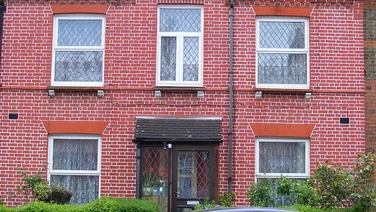- Myth: Double glazing is not value for money
- Myth: There is no financial help for double glazing
- Myth: Double glazing doesn’t last long
- Myth: Double glazing is difficult to maintain
- Myth: You can’t repair cracked or blown double glazing
- Myth: Double glazing only fits on uPVC windows
- Myth: Double glazing is no different to secondary glazing
- Myth: Double glazing doesn’t stop condensation
- Myth: Double glazing is only suited to newbuilds
- Myth: It’s difficult to replace double glazing
- Summary
- Double glazing requires no upfront cost and offers long-term financial benefits through energy savings.
- Many financial aid schemes, like ECO4 and the Affordable Warmth Grant, are available to help with double-glazing costs.
- Properly maintained double glazing lasts 20 to 50 years, making it a sensible investment.
Double glazing is a popular choice for homeowners seeking to improve energy efficiency, reduce heating costs, and reduce their carbon footprint.
By using two panes of glass with a gas-filled gap between them, double glazing helps insulate homes, keeping heat in during winter and reducing the need for excessive energy use.
Double-glazing also helps to reduce outside noise (especially in cities), providing additional security for your home.
While installation can cost between £300 and £5,000 per window, it often pays for itself through energy savings over time.
Aside from financial savings, double glazing also improves home security and comfort. However, several persistent myths surround it.
Here, we’ll debunk these misconceptions and clarify why double glazing is a valuable investment for your home.

Here are some common myths about double glazing. Credit: Mark Crawley/Flickr
Myth: Double glazing is not value for money
Reality: No upfront costs and definitely a wise investment
Double glazing absolutely is value for money. Typically, double-glazing installations do not require an upfront payment, and the cost usually pays off quickly.
Depending on the window specification, it can cost between £300 and £5,000+ per double-glazed window. You can expect to pay between £5,000 and £7,000 for a three-bedroom house to change all windows.
Double-glazing improves energy efficiency and has other benefits, like increased home security. To give you an idea of the savings you’ll make on your bills, a detached house with A-rated windows typically saves between £120 and £155 per year on heating bills.
Semi-detached houses are between £80 and £100, and a bungalow is around £55 to £75 a year.
Myth: There is no financial help for double glazing
Reality: There are grants to help with the cost of double glazing
Nope! Double-glazing is one of the most common energy-saving measures for many government grants. These schemes will either cover the full cost or set amount to help make them more affordable for most people (if you are eligible of course).
Various schemes exist, including ECO4, Home Upgrade Grant (discontinued as of March 2025), the Warm Homes Local Grant, Home Energy Grant and Loan, and the Affordable Warmth Grant being prime examples.

Double-glazing is one of the best ways to save on heating bills you can buy. Credit: Bleekman/Wikimedia Commons
Myth: Double glazing doesn’t last long
Double glazing can last decades
Another common myth is that double-glazing units do not last very long. In reality, as most units (even the cheaper ones) can last decades if looked after properly.
Double glazing typically lasts 20-30 years and up to 50 years with proper maintenance. Like any building element, the expected lifespan depends entirely on the frame material, how well it is cleaned and maintained, and the kinds of weather it is exposed to.
The glazing elements tend to be more robust than traditional single-glazed windows, but the gas between the panes of glass can leak if the sealant to them perishes.
This typically happens over time as the windows heat up and cool down quickly, causing the panes to detach. However, with proper maintenance, this can be avoided.
Myth: Double glazing is difficult to maintain
Reality: Double glazing only needs to be cleaned every few months
Just like regular windows and doors, regular cleaning will make sure your double glazing has a long a lifespan as possible. If you can clean them every few months, you can expect to reap the benefits for longer.
Cleaning helps prevent the buildup of grime and dirt that can make the hinges stick or cause the glass to become encrusted. You should also regularly inspect and test hinges and locks, lubricating them when needed.
You should also check windows and doors for excessive condensation, especially between the panes of glass. If you see this, it is usually a sign that the sealant to the gas gap between them has failed.
It would be best to keep the tracks free of grit and grime for sliding windows to ensure they can move smoothly. The typical wood maintenance regime applies for timber-framed double-glazing, so look for aging varnish and repaint/reseal as normal.
Myth: You can’t repair cracked or blown double glazing
Reality: You CAN repair cracked and blown double glazing
Like most things in life, damaged double-glazing can, of course, be repaired, at least for a time.
Various DIY repair kits are on the market, and these typically involve either completely resealing the unit or cleaning up any misting inside the glass panes.
However, such fixes are typically only temporary fixes. Double-glazing works best when the seal is not compromised, and some units have a special kind of gas between the glass panes to help reduce solar gain/heat loss.
It is usually best to completely replace the compromised unit with a professional double-glazing company.
Myth: Double glazing only fits on uPVC windows
Reality: Double glazing fits onto all types of windows
This myth likely started in the earlier days of double-glazing, sometime in the 1980s or 1990s. However, like other myths on our list, this is not true.
Like traditional windows, double-glazing comes in many sizes and shapes and can be tailored to fit almost any window opening.
The frame can be made of the “classic” uPVC material, metal (aluminum), or wood. The latter two tend to be the least efficient (from an energy-saving point of view) but are favoured for older homes.
Timber may especially be required for listed buildings or properties in a preservation area.

Double-glazing (in this case, quadruple-glazing) can be fitted to most buildings. Credit: Alek14/Wikimedia Commons
Myth: Double glazing is no different to secondary glazing
Reality: Double glazing is more effective than secondary glazing
This is another common myth, but a quick consideration will show you that it is, of course, not true.
Double-glazing is a specially designed window unit consisting of two panes of glass in a special frame with a sealed air/gas gap between them. On the other hand, secondary glazing is where a second single-pane glazing unit is fitted behind an existing single-glazed unit.
Secondary glazing has no sealed gap between the two windows and is typically installed to provide soundproofing rather than help reduce heat loss or block UV light (preventing solar heat gain) in the summer.
It is typically cheaper than double-glazing and is sometimes preferred for listed buildings or buildings in preservation areas.
Myth: Double glazing doesn’t stop condensation
Reality: Condensation is caused by poor maintenance of double glazing
Condensation is a persistent problem in relatively climates that get a lot of rain, such as the UK. However, it is typically the result of poor maintenance of things like windows or poor ventilation in a home.
Most double-glazing units come with trickle vents designed to help control airflow through the unit. If blocked or sealed, this will prevent water vapour from escaping your house, forming water droplets when cooled down by touching cold surfaces, like the inside of windows in the winter.
You’ll typically experience condensation in places where you cook or wash (kitchen or bathrooms) or against parts of your home that are exposed to wind. For this reason, it is best to ensure you properly ventilate your home and avoid activities like drying clothes regularly indoors.
Myth: Double glazing is only suited to newbuilds
Reality: Double glazing can be used on any building of any age
United Kingdom building regulations typically, though not always, insist that new builds come with double-glazing as standard. But this doesn’t mean they are only suited for newly built properties.
There is theoretically no limit to the age of the building in which double-glazing can be installed. However, as we’ve touched on, some special circumstances are forbidden or not advised to install them.
Listed buildings are specially protected in the UK and typically cannot have alterations, like double-glazed windows, that materially change their appearance. The same is also true for buildings within designated preservation zones.
However, options for specially designed mock period double glazing units exist, which typically require the frames to be made of timber or mock timber.
Myth: It’s difficult to replace double glazing
Reality: There are schemes that you can use to replace your double glazing
Like any window or door, double-glazing can be readily replaced. Replacing double-glazing with new double-glazing is usually easier than preparing older window openings for virgin double-glazing.
Today, even scrappage schemes can help recycle older units and save you a little money on a new installation. One example is the Anglican Window scrappage scheme.
When you participate in the Anglian Scrappage Scheme, you can save around £1,000 on new windows and doors. This is especially beneficial given the generally high costs associated with installing double glazing in your home.

Like any window, double-glazing can be accidentally damaged or fail over time. Credit: Alek14/Wikimedia Commons
Summary
- Double glazing improves energy efficiency, lowering heating bills annually across different house types.
- Various grants and schemes exist to cover or reduce the cost of double-glazing for eligible homeowners.
- Cleaning every few months is sufficient to maintain double glazing’s performance and extend lifespan.
- While repairs for cracked or blown double glazing are possible, professional replacement often yields better results.
- Double glazing is not limited to uPVC frames; it can be installed on wood, aluminum, and other materials.
- Double glazing is suitable for homes of any age, from new builds to older properties, with specialized options for listed buildings.





